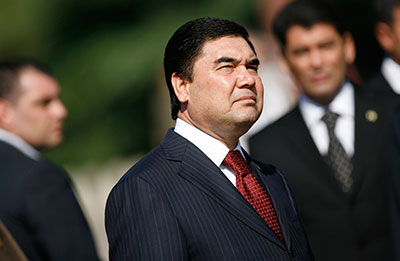Turkmenistan is trying to burnish its image by passing its first law on press freedom. On January 4th, President Gurbanguly Berdymukhamedov signed a law that bans press censorship, bars the government from monopolizing news outlets, and grants the public access to all forms of information, including independent and foreign reporting.
Unfortunately, reform appears to be only posturing and the most repressive and hermetic country in Eurasia remains just that.
According to news reports, the articles of the law state that “no one can deny or prevent the media from disseminating information of public interest,” that government will “follow a policy of non-abuse” and “principally ban the monopolization of media corporations and individuals,” and that Turkmen citizens are free to “use any form of media for expression and opinion to seek, receive, and disseminate information.”
In accordance, Berdymukhamedov renounced his ownership of the country’s newspapers this month. But the president isn’t actually abandoning control. According to reports by Regnum News and EurasiaNet, many of the country’s newspapers will now be owned by the Cabinet of Ministers–of which the president is head. Other publications will be owned by trade unions and the Ministry of Education, all of which are loyal to the president. Moreover, journalists at all outlets will still be appointed by presidential decree, according to the reports.
The existence of media freedom and pluralism is an illusion. The country has 39 newspapers, five radio stations, seven TV stations and one press agency, reports Lenta.Ru. All but one was owned by the president until January 25th of this year. The outlets compete to best chronicle the leader’s achievements and glorify the state. Even the sole privately-owned publication, Rysgal, was created on instruction of the president and only reports on business and real-estate news. As far as the international press goes, U.S. government-funded Radio Free Europe/Radio Liberty (RFE/RL) has the last network of correspondents in the country releasing independent news on democracy and human rights issues to the rest of the world with only twelve stringers according to CPJ research. Internet penetration was estimated at 5% in 2011, according to the International Telecommunications Union (ITU) and the country has the most expensive Internet connections in the world. Authorities have removed many satellite dishes on presidential orders.
President Berdymukhamedov’s government promotes a unified narrative about his magnanimity and the state of Turkmenistan’s civil liberties. The late President Saparmurat Niyazov dominated every sphere of life for the Turkmen people before he died in 2006, and Berdymukhamdov has followed suit, not losing momentum since he assumed office in 2007. According to RFE/RL, books authored by the president, covering everything from health to horse breeds, are required reading in schools; his portrait is everywhere; and the streets have been renamed after his relatives. But attempting to contrast Niyazov, Berdymukhamedov calls himself a reformer and emphasizes Turkmenistan’s “epoch of magnificence” and “renaissance.”
Nonetheless, the country’s economy remains underdeveloped, with much of the population living in poverty. Many foreign investors keep their distance, despite Turkmenistan’s expansive oil and natural gas reserves. To turn this around, Berdymukhamedov has been actively seeking Western legitimacy. To boost the country’s credentials as a reliable economic partner, the president disbanded some of his idiosyncratic predecessor’s draconian cultural restrictions, such as bans on circus and opera, and adopted a new constitution in 2008.
Still, no real steps have been taken to address deep-seated social injustice or lack of media freedom. Criticizing the government or the president is unheard of, and have been harassed, imprisoned, and even, in the case of RFE/RL correspondent Ogulsapar Muradova, killed with impunity. Human-rights workers Annakurban Amanklychev and Sapardurdy Khadzhiyev–arrested together with Muradova on trumped-up charges in 2006– were recently released after serving seven-year prison terms.
UPDATE: The post has been corrected to reflect that at time of publication, human rights workers Annakurban Amanklychev and Sapardurdy Khadzhiyev had recently been freed after serving out their prison terms.
